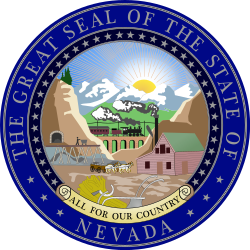| |||||||||||||||||
| |||||||||||||||||
 County results Cannon: 50–60% 60–70% Laxalt: 50–60% 60–70% 70–80% | |||||||||||||||||
| |||||||||||||||||
| Elections in Nevada |
|---|
 |
The 1964 United States Senate election in Nevada was held on November 3, 1964. Incumbent Democratic U.S. Senator Howard Cannon won re-election to a second term by a slim margin of only 48 votes. Cannon defeated Paul Laxalt by a very narrow margin despite Lyndon Baines Johnson winning the state over Barry Goldwater in a landslide in the concurrent presidential election in Nevada.
Contents
To date, this remains the closest Senate race in US history since the passing of the 17th amendment in which the winner was seated as Senator.[ citation needed ] [a]

